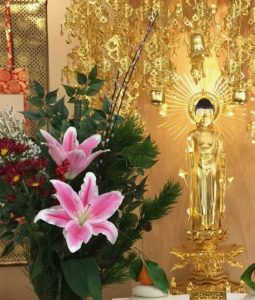
By Rev. Marcos Sawada
Shakyamuni Buddha said, “Life (the self) is an illusion!” Is life really an illusion? Here’s a perspective I learned from two dharma teachers, Rev. Yutai Ikeda and Rev. Nobuo Haneda.
First, let’s think from a religious perspective. Imagine a lady in her forties. She was a nice mother and since an early age, she had been going continuously to a temple. She dedicated her life to temple activities. Suddenly she got sick, and after a few days, she passed away. Her brother became very angry and said, “She was a deeply religious person. Why did she suddenly pass away like that? She was such a dedicated Buddhist, why didn’t Buddha save her from such a tragic ending? She deserved better.” The brother couldn’t accept what happened to her.
The brother’s understanding or interpretation of religious life was an ego-centered approach. His misunderstanding about religious life made him design his own god or Buddha, shaped by his desires.
What about you? Do you have an aspiration to be saved or liberated from your feelings of insecurity, expecting one day to be awakened as a Buddha? In our minds, we create an ideal of what religion should be and become attached to that ideal. At certain moments in life, we face challenges and struggles that force us to question and doubt our understanding of spirituality.
I think there’s a tendency to live in a religious realm created to reap benefits for ourselves. This isn’t a real religious life. This is only the working of our egos. As humans, we live in a world of fantasy, formatting a model of religion to satisfy our egotistical desires. When that model is broken, we deny religion. When that happens, we must face our actual self. That is when the true meaning of religion surfaces. We need to encounter suffering to begin this new relationship with religion.
Becoming hopeless and struggling is an opportunity to reflect on ourselves and connect to something greater than our ego-centered world. For Buddhists, it is the Dharma, the Truth, which guides and awakens us. For other religions, it can be God. It may be called an awakening to all connections we have and that are not contaminated by human passions and desires.
Usually we continue wearing blinders expecting religion to transform our situation from insecurity to security. We believe that as Buddhists, if we keep listening to the teaching of the Buddha, we will one day wake up as a Buddha who can eliminate all worldly passions. We believe one day, we can transform the reality of this world. This is illusory because in our egotistical world, how can a certain situation be transformed into another like magic merely based on our wishes? This is not the Buddhist way. Humans cannot solve problems created by their own human-centered perspective.
As sensei Shuichi Maida used to say, “Your right hand cannot grab your right hand.” This means the ego cannot solve problems caused by the ego. Only wisdom is the solution.
This insecure world will never disappear! Buddha told us that life is an illusion and we must wake up from this dream called existence. We humans use our intellect to create this modern world. As we make life seemingly easier by developing more and more technology and science, we delude ourselves into thinking we have solutions for all worldly problems.
What does reality show us about our human solutions? It is expressed in conflicts and wars, killings, deception, cheating, tricking, and betraying others. You may agree or not, but this is our collective karma reflected by our individual karma and vice versa. Collective karma comes from each one living in this Samsara: our individual egos create this illusory world in our minds.
Everyone has insecurities. As humans, the feeling of becoming unhappy persecutes us and follows us everywhere. If we avoid or deny these insecurities, they will drain us.
Being saved in Buddhism isn’t about removing our insecurities, but rather, clearly seeing and understanding those insecurities. We cannot change the world to satisfy our desires. However, we can change our way of living and the meaning of our situation. This is the wisdom of Buddha or Hongan—having a harmonious perspective.
Listening to the Dharma is the Nembutsu follower’s way of life. It is the moment when we are back to our neutral state, or emptiness: the reality of right now, which is neither good nor bad. Delegating ourselves alone to the Dharma is what Shinran called deep entrusting or Shinjin. Life lives you!
Namu Amida Butsu.
Rev. Sawada is minister of Hilo Higashi Honganji Temple in Hawaii.

